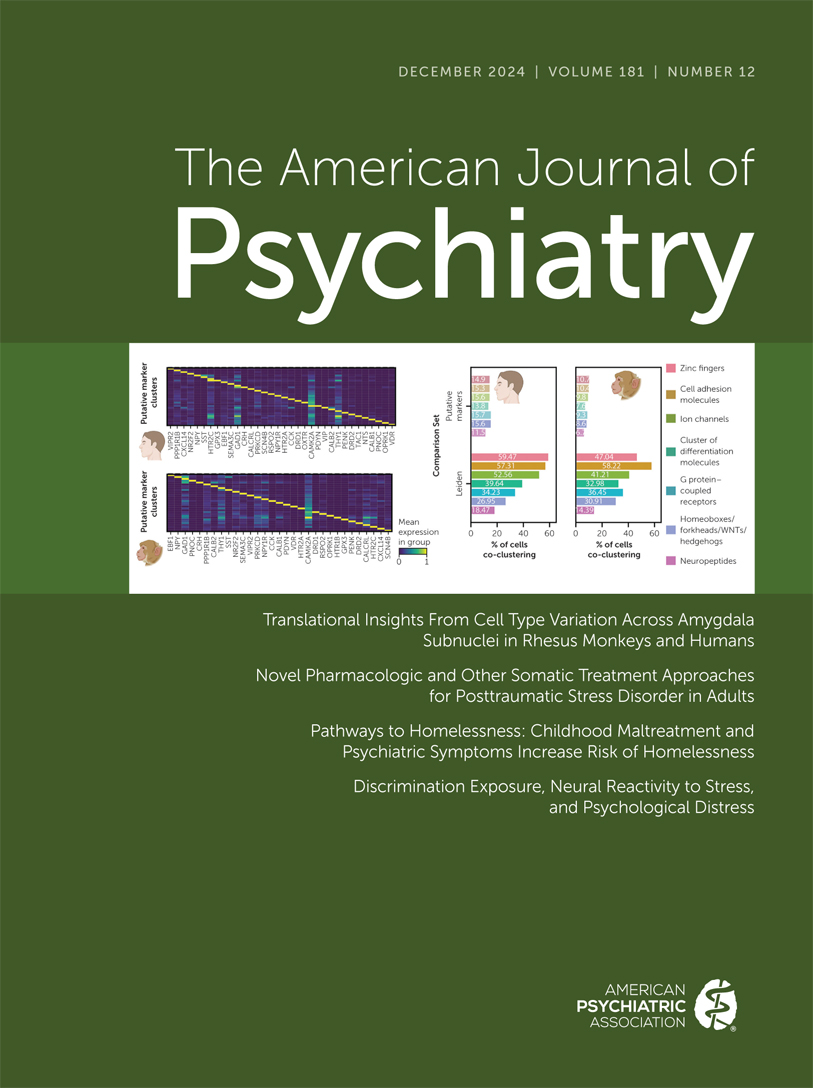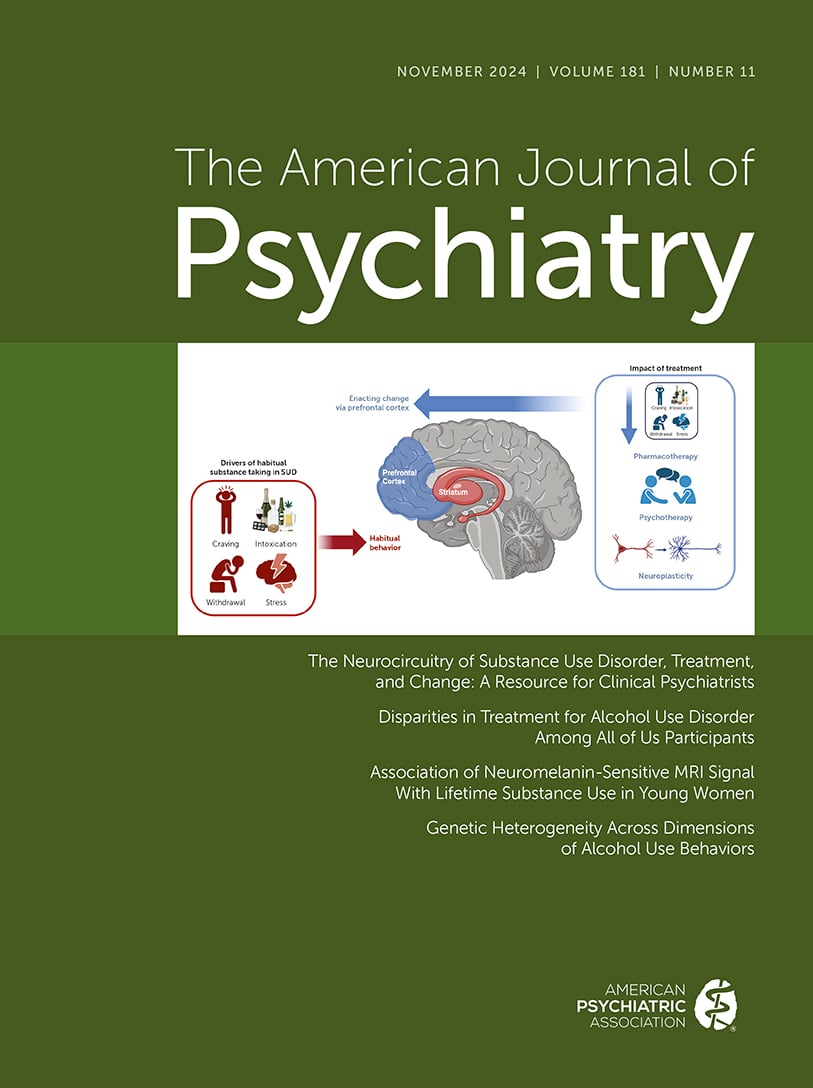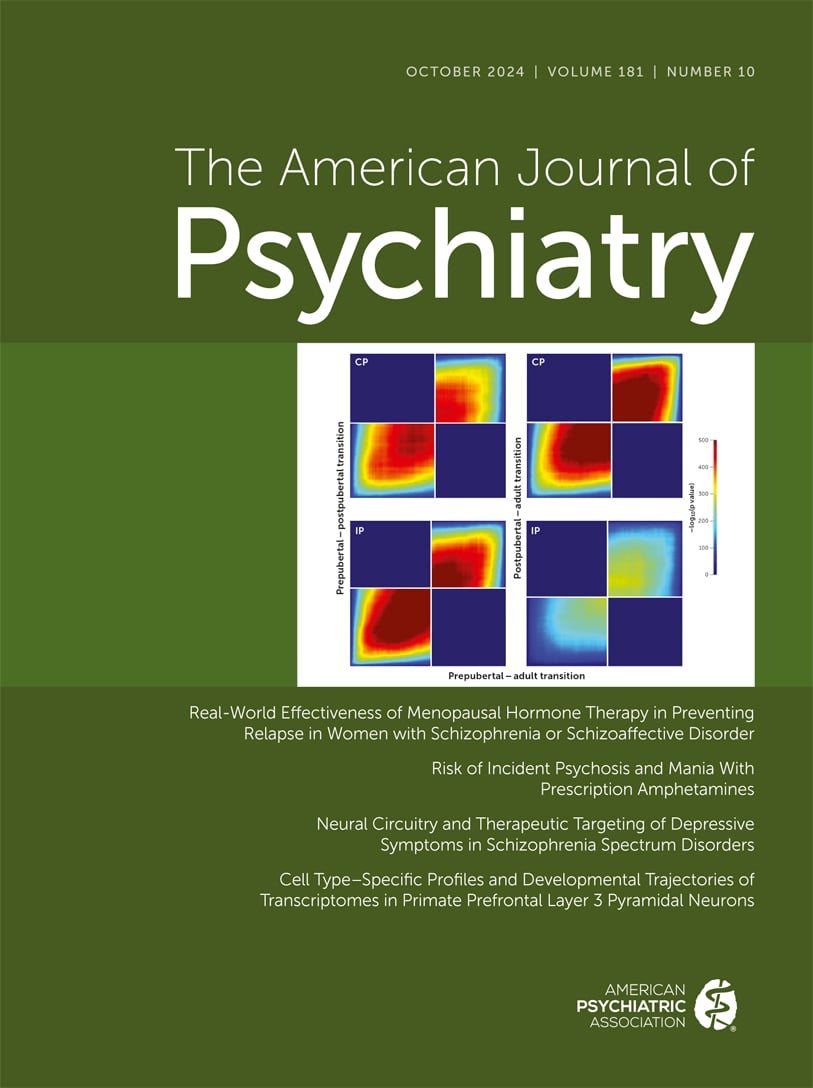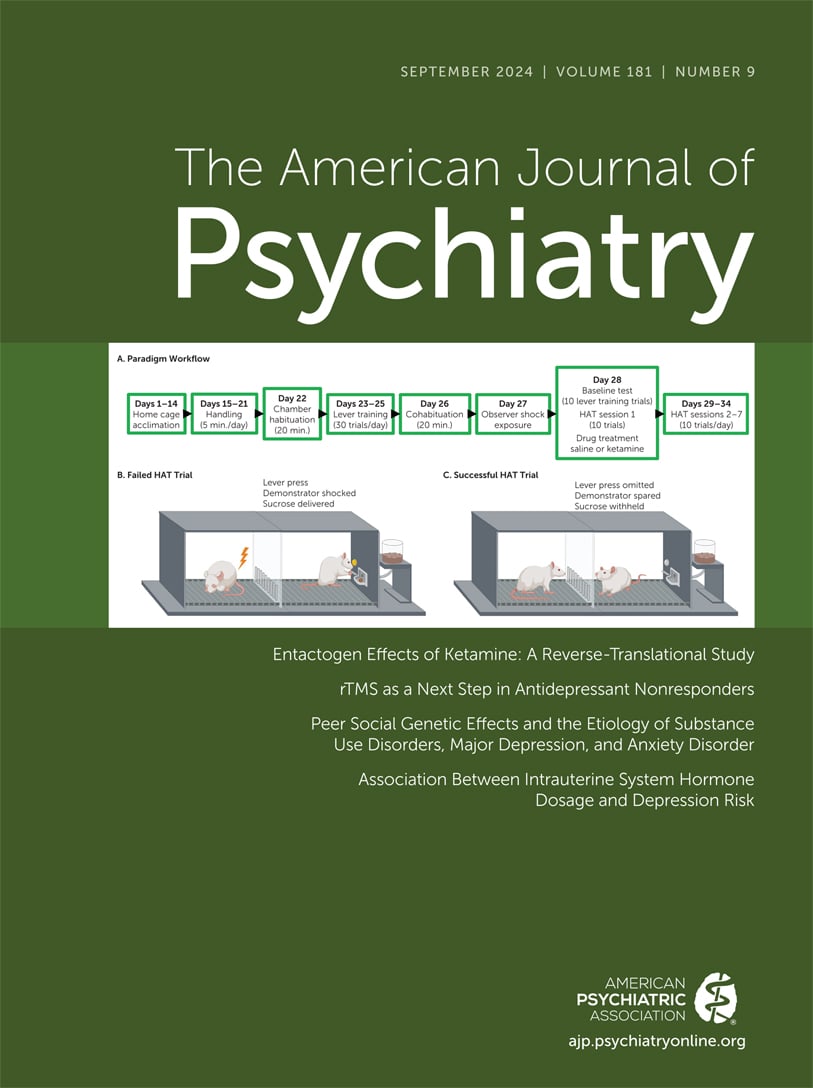American Journal of Psychiatry
- Volume 159
- Number 3
- March 2002
Editorial
Reviews and Overviews
Publication date: 01 March 2002
Pages351–358OBJECTIVE: Disruptive behavior problems are the most common reason preschool children come to mental health clinics. Yet consensus on the conceptualization and measurement of such problems in young children is lacking. DSM-IV is the most widely used ...
https://doi.org/10.1176/appi.ajp.159.3.351Publication date: 01 March 2002
Pages359–371OBJECTIVE: A longstanding belief among many clinicians is that patients with depression and comorbid personality pathology have a worse response to standard depression treatment. This presents potentially significant treatment implications, since ...
https://doi.org/10.1176/appi.ajp.159.3.359Images in Neuroscience
Clinical Case Conference
Images in Psychiatry
Article
Publication date: 01 March 2002
Pages380–386OBJECTIVE: The text of the DSM-IV states that a diagnosis of conduct disorder should be made only if symptoms are caused by an internal psychological dysfunction and not if symptoms are a reaction to a negative environment. However, the DSM-IV diagnostic ...
https://doi.org/10.1176/appi.ajp.159.3.380Publication date: 01 March 2002
Pages387–393OBJECTIVE: Previous research has reported an association between childhood adversity and the nonendogenous subtype of depression. The present study sought to address this association by 1) investigating the relationship between depression subtype and ...
https://doi.org/10.1176/appi.ajp.159.3.387Publication date: 01 March 2002
Pages394–400OBJECTIVE: A community-based prospective longitudinal study was conducted to investigate the association between childhood adversities and problems with eating or weight during adolescence and early adulthood. METHOD: A community-based sample of 782 ...
https://doi.org/10.1176/appi.ajp.159.3.394Publication date: 01 March 2002
Pages401–407OBJECTIVE: The authors determined the impact of different pathways of psychopathological development on adult outcome in subjects followed from ages 11–18 to ages 21–28. METHOD: Problem behaviors of subjects from a general population sample were assessed ...
https://doi.org/10.1176/appi.ajp.159.3.401Publication date: 01 March 2002
Pages408–411OBJECTIVE: The authors assessed lifetime and 6-month occurrence and phenomenology of self-injurious behavior in patients with eating disorders. METHOD: Women (N=376) in inpatient treatment for an eating disorder (anorexia: N=119, bulimia: N=137, eating ...
https://doi.org/10.1176/appi.ajp.159.3.408Publication date: 01 March 2002
Pages412–418OBJECTIVE: The latent structure of eating disorder symptoms, as defined by DSM-IV, was tested in a group of 341 women with and without an eating disorder diagnosis. METHOD: The study group consisted of 201 participants with a diagnosis of anorexia nervosa,...
https://doi.org/10.1176/appi.ajp.159.3.412Publication date: 01 March 2002
Pages419–429OBJECTIVE: Abnormalities of serotonin (5-HT) receptor subtypes have been observed in the postmortem brains of adult suicide victims; however, their role in teenage suicide is unexplored. The authors examined whether 5-HT2A receptor subtypes are altered in ...
https://doi.org/10.1176/appi.ajp.159.3.419Publication date: 01 March 2002
Pages430–435OBJECTIVE: Earlier work has shown markedly lower density of serotonin 2A (5-HT2A) receptors in elderly subjects than in young healthy subjects. In this study the authors used positron emission tomography (PET) and [18F]altanserin, a ligand with high ...
https://doi.org/10.1176/appi.ajp.159.3.430Publication date: 01 March 2002
Pages436–442OBJECTIVE: This study was a prospective, population-based examination of the evolution of cognitive impairment, no dementia (CIND). METHOD: Subjects 75 years old or older living in Stockholm were assessed at baseline and 3 and 6 years later. The severity ...
https://doi.org/10.1176/appi.ajp.159.3.436Publication date: 01 March 2002
Pages443–449OBJECTIVE: Patients with a diagnosis of schizophrenia display cognitive impairments and abnormal sensitivity to stress. However, little is known about the relationship between these two endophenotypes. METHOD: Neuropsychological tests were administered to ...
https://doi.org/10.1176/appi.ajp.159.3.443Publication date: 01 March 2002
Pages450–455OBJECTIVE: The authors’ goal was to study the importance of different psychiatric disorders in relation to suicide in individuals 65 years old or older. METHOD: The psychological autopsy approach was used to study 85 cases of suicide among subjects who ...
https://doi.org/10.1176/appi.ajp.159.3.450Publication date: 01 March 2002
Pages456–459OBJECTIVE: A decline in hypothalamic-pituitary-gonadal (HPG) axis function is often seen in elderly men, and dysthymic disorder is common. Symptoms of both HPG axis hypofunction and dysthymic disorder include dysphoria, fatigue, and low libido. The ...
https://doi.org/10.1176/appi.ajp.159.3.456Publication date: 01 March 2002
Pages460–465OBJECTIVE: Until recently, conventional antipsychotics were the standard pharmacotherapy for psychosis and behavioral disturbances associated with dementia. This double-blind, placebo-controlled study compared the acute efficacy of the selective serotonin ...
https://doi.org/10.1176/appi.ajp.159.3.460Publication date: 01 March 2002
Pages466–468OBJECTIVE: This study examined the effects of maintenance treatment for late-life depression on social adjustment. The authors hypothesized that elderly patients recovering from depression would have better social adjustment with medication and ...
https://doi.org/10.1176/appi.ajp.159.3.466Publication date: 01 March 2002
Pages469–473OBJECTIVE: The methods used to evaluate the efficacy of antidepressants differ from treatment for depression in routine clinical practice. The rigorous inclusion/exclusion criteria used to select subjects for participation in efficacy studies potentially ...
https://doi.org/10.1176/appi.ajp.159.3.469Brief Report
Publication date: 01 March 2002
Pages474–476OBJECTIVE: The aim of this study was to establish an objective and reliable index to predict the development of Alzheimer’s disease in a large pool of elderly patients with mild cognitive impairment. METHOD: Twenty-three patients with probable Alzheimer’s ...
https://doi.org/10.1176/appi.ajp.159.3.474Publication date: 01 March 2002
Pages477–479OBJECTIVE: Studies have reported that countries with high rates of fish oil consumption have low rates of depressive disorder. The authors studied a specific omega-3 fatty acid, the ethyl ester of eicosapentaenoic acid (E-EPA), as an adjunct to treatment ...
https://doi.org/10.1176/appi.ajp.159.3.477Publication date: 01 March 2002
Pages480–482OBJECTIVE: The authors investigated the clinical effects of d-cycloserine when added to treatment with conventional neuroleptics, olanzapine, or risperidone for treatment-resistant schizophrenia. METHOD: Twenty-four patients participated in a double-blind,...
https://doi.org/10.1176/appi.ajp.159.3.480Publication date: 01 March 2002
Pages483–486OBJECTIVE: Studies in adults have reported changes in concentration, learning, and memory in individuals with posttraumatic stress disorder (PTSD). However, there are few studies of cognitive function in children with PTSD. The goal of the current study ...
https://doi.org/10.1176/appi.ajp.159.3.483Publication date: 01 March 2002
Pages486–488OBJECTIVE: The goal of this study was to investigate associations between empirically defined dimensions of spirituality, personality variables, and psychiatric disorders in Vietnam era veterans. METHOD: One hundred pairs of male twins from the Vietnam ...
https://doi.org/10.1176/appi.ajp.159.3.486Publication date: 01 March 2002
Pages489–491OBJECTIVE: The purpose of this study was to investigate temperamental, psychodynamic, and cognitive factors associated with dissociation. METHOD: Fifty-three subjects with DSM-IV-defined depersonalization disorder and 22 healthy comparison subjects were ...
https://doi.org/10.1176/appi.ajp.159.3.489Letter to the Editor
Book Forum: Neuropsychiatry
Book Forum: Psychotherapies
Book Forum: Psychoanalysis
Book Forum: Mental Illness and Its Boundaries
Correction
Past Issues
View Issues Archive
Vol. 181 | No. 12

Vol. 181 | No. 11

Vol. 181 | No. 10
